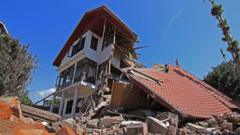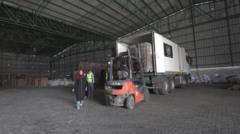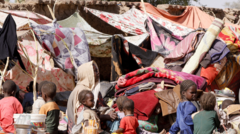As Palestinians express their frustrations, the grip of Hamas over Gaza begins to wane.
**Growing Dissent in Gaza: Anti-Hamas Protests Gain Momentum**

**Growing Dissent in Gaza: Anti-Hamas Protests Gain Momentum**
Public discontent brews against the ruling group as protests erupt amidst escalating violence.
In a striking turn of events, thousands of Palestinians are taking to the streets in Gaza, openly expressing their dissent against Hamas, the group that has governed the territory for nearly two decades. Shouting chants like "Out! Out! Out!" and "Hamas is garbage," demonstrators are holding Hamas accountable for the dire situation that the region has faced, characterized by deep-rooted poverty and ongoing conflict.
Local activist and lawyer, Moumen al-Natour, articulated the prevailing sentiment, stating, "The world thinks that Gaza is Hamas and Hamas is Gaza. We didn't choose Hamas." This defiance comes with significant risk, as Hamas has historically suppressed opposition with violence and intimidation. Al-Natour, who has been vocal about his opposition to Hamas, recently wrote about the group's detrimental impact on Palestinian life, declaring, "To support Hamas is to be for Palestinian death, not Palestinian freedom."
The protests have escalated in light of recent tragedies, like the murder of Oday al-Rubai, a young protester found tortured and killed following his participation in anti-Hamas demonstrations. His family attributes his death to Hamas, demanding accountability for what they perceive as state-sponsored violence against dissenters. In stark contrast, many residents feel emboldened to speak out, with some even resisting Hamas forces attempting to launch militaristic actions from civilian neighborhoods.
Testimonies from observers have described moments of fierce community solidarity, such as when residents of Beit Lahiya banded together to repel armed militants from using a local man's home for rocket launches. Eyewitness accounts detail how courage trumped fear, with community members insisting, “We don't want you in this place. We don't want your weapons that have brought us destruction.”
While the protests signal a significant shift, they come at a perilous time; Hamas continues to unleash brutal repression on critics. The ongoing Israeli-Palestinian conflict further complicates the situation, leaving residents feeling caught between conflicting forces. Amin Abed, a former resident who now lives outside Gaza, noted that many people view the hostile landscape as a "choice between cholera and the plague."
Though these protests may not yet constitute a full-blown rebellion, they reflect a growing discontent that could alter the political landscape in Gaza as the longstanding control of Hamas is increasingly challenged by its own populace.
Local activist and lawyer, Moumen al-Natour, articulated the prevailing sentiment, stating, "The world thinks that Gaza is Hamas and Hamas is Gaza. We didn't choose Hamas." This defiance comes with significant risk, as Hamas has historically suppressed opposition with violence and intimidation. Al-Natour, who has been vocal about his opposition to Hamas, recently wrote about the group's detrimental impact on Palestinian life, declaring, "To support Hamas is to be for Palestinian death, not Palestinian freedom."
The protests have escalated in light of recent tragedies, like the murder of Oday al-Rubai, a young protester found tortured and killed following his participation in anti-Hamas demonstrations. His family attributes his death to Hamas, demanding accountability for what they perceive as state-sponsored violence against dissenters. In stark contrast, many residents feel emboldened to speak out, with some even resisting Hamas forces attempting to launch militaristic actions from civilian neighborhoods.
Testimonies from observers have described moments of fierce community solidarity, such as when residents of Beit Lahiya banded together to repel armed militants from using a local man's home for rocket launches. Eyewitness accounts detail how courage trumped fear, with community members insisting, “We don't want you in this place. We don't want your weapons that have brought us destruction.”
While the protests signal a significant shift, they come at a perilous time; Hamas continues to unleash brutal repression on critics. The ongoing Israeli-Palestinian conflict further complicates the situation, leaving residents feeling caught between conflicting forces. Amin Abed, a former resident who now lives outside Gaza, noted that many people view the hostile landscape as a "choice between cholera and the plague."
Though these protests may not yet constitute a full-blown rebellion, they reflect a growing discontent that could alter the political landscape in Gaza as the longstanding control of Hamas is increasingly challenged by its own populace.



















